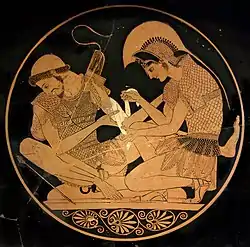Trojan War
English
Proper noun
- (Greek mythology) A mythological decade-long war and siege, ending in the destruction of Troy, which, as described in Homer's Iliad, was waged by a coalition of Achaeans (Greeks) led by King Agamemnon against the Trojans to avenge the abduction of Helen, wife of the Spartan King Menelaus, by Paris, son of the Trojan King Priam.
- 1952, Olivia E. Coolidge, The Trojan War, 1980, Houghton Mifflin, page ix,
- For the greater part of three thousand years since the date of the Trojan War, the imagination of poets and dramatists has been busy with its story.
- 2001, Jonathan S. Burgess, The Tradition of the Trojan War in Homer and the Epic Cycle, Johns Hopkins University Press, 2004, Paperback, page 1,
- The poems of the Epic Cycle are now lost. But what we know about them from ancient evidence is extremely important for our understanding about myth of the Trojan War. The poems of the Epic Cycle share the same mythological tradition with the famous Homeric poems, the Iliad and the Odyssey, and in fact the Epic Cycle is even more representative of the Trojan War tradition than the Homeric poems.
- 2013, Eric H. Cline, The Trojan War: A Very Short Introduction, Oxford University Press, page 1,
- The Greeks and Romans believed that the Trojan War was both a real event and a pivotal point in world history; Herodotus and Thucydides discussed the Trojan War briefly in the opening pages of their respective books, written in the fifth century BCE.
- 1952, Olivia E. Coolidge, The Trojan War, 1980, Houghton Mifflin, page ix,
Translations
mythological war
|
|
See also
Further reading


This article is issued from Wiktionary. The text is licensed under Creative Commons - Attribution - Sharealike. Additional terms may apply for the media files.
